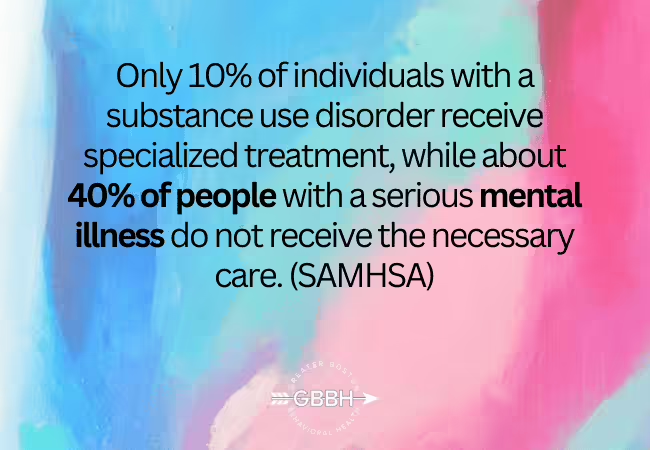Behavioral health and mental health are interchangeable terms, but there is a huge difference between them. Both cover distinct aspects of well-being.
When it comes to mental well-being, the terms behavioral health and mental health are often used interchangeably. However, while these terms overlap in many ways, they each have distinct meanings that are important to understand. At Greater Boston Behavioral Health, we recognize the significance of these differences in how we approach treatment and care.
If you’re curious about the difference, stay tuned to this blog and learn the facts that help you understand the concepts. So, let’s get down!
What is Mental Health?
Mental health is a part of overall wellness that focuses on well-being’s emotional, psychological, and social dimensions. It determines how we think, feel, and behave in everyday life and how we deal with stress, interact with people, and make decisions. Genetics, brain chemistry, life events, and trauma can all impact mental health.
Common mental health problems include:
- Depression
- Anxiety
- Bipolar disorder
- Schizophrenia
Mental health is frequently handled with therapeutic methods, drugs, or a mix of the two. Mental Health Therapy programs focus on controlling thoughts and emotions while also treating the underlying causes of psychological suffering.
What is Behavioral Health?
Behavioral health is a wide phrase that includes both mental health and how habits affect overall well-being. Behavioral health is the relationship between behavior and the body, mind, and spirit. It investigates how behavioral habits such as sleeping, eating, exercising, substance abuse and even social interactions influence overall health.
While mental health focuses on emotional and psychological well-being, behavioral health takes into account behaviors and actions that can either contribute to or detract from wellness. Behavioral health challenges can be evident in various forms, such as substance abuse, eating disorders, and compulsive habits. Addressing these issues is crucial for overall well-being and a healthier future. Some examples of behavioral health issues are:
- Substance use disorders
- Eating disorders
- Compulsive behaviors
- Sleep disorder
Behavioral health specialists frequently work on modifying specific behaviors or patterns that contribute to physical and mental health issues. These interventions could include Cognitive Behavioral therapy, lifestyle adjustments, education, and other sorts of assistance.
Key Differences Between Behavioral Health and Mental Health
There is an intense connection between behavioral and mental health. For example, someone suffering from depression may use substances as a coping mechanism. Conversely, unhealthy behaviors such as substance misuse or excessive screen time can exacerbate mental health problems.
However, the key Distinctions between Behavioral and Mental Health rely on:
1.Scope of Treatment
- Mental health typically focuses on disorders like depression, anxiety, and schizophrenia. Treatment often involves psychotherapy, medication, or a combination of both.
- Behavioral health includes a broader range of treatments for behavioral issues like substance abuse, eating disorders, and self-destructive behaviors. It integrates both psychological and physical aspects of well-being.
2. Focus on Behaviors
- Mental health treatment often focuses on the underlying psychological causes of symptoms.
- Behavioral health treatment addresses the behaviors themselves and how they contribute to both mental and physical health. For instance, anger management in Boston programs focus on how behaviors like impulsivity or aggression affect overall well-being.
3. Treatment Modalities
- Mental health is often treated through therapies like CBT and medication.
- Behavioral health interventions might include therapy for emotional regulation, as well as lifestyle changes like improving sleep habits, nutrition, or physical activity.
Connection Between Mental Health and Behavioral Health
Mental health and behavioral health are deeply interconnected, as one often influences the other. Mental health refers to an individual’s emotional, psychological, and social well-being, impacting how they think, feel, and behave. Behavioral health, on the other hand, focuses on how behaviors—whether positive or negative—affect overall health, including emotional well-being.
For example, a mental health condition such as depression may lead to unhealthy behaviors, like substance abuse, social withdrawal, or neglecting self-care. Similarly, engaging in behaviors such as excessive drinking or drug use can worsen mental health conditions, leading to anxiety, depression, or mood disorders. These behaviors may act as coping mechanisms for underlying mental health challenges, but they often exacerbate the problem over time.
Moreover, the relationship is reciprocal: managing one often requires addressing both. Treatment for mental health conditions frequently includes addressing the behavioral habits that contribute to or stem from the condition. Conversely, treating behavioral health issues, like addiction or eating disorders, often involves working through the underlying emotional or psychological factors that drive those behaviors.
Common Conditions in Behavioral Health vs. Mental Health
While there is significant overlap between mental health and behavioral health issues, each category has its own set of common conditions. Here’s a closer look at the typical conditions found in each:
Mental Health Conditions
1. Depression
A mood disorder that causes persistent feelings of sadness, hopelessness, and a lack of interest in activities once enjoyed. It impacts how a person thinks, feels, and behaves and can interfere with daily functioning.
2. Anxiety Disorders
Conditions like generalized anxiety disorder, panic disorder, and social anxiety disorder cause excessive worry, fear, and stress, which can hinder normal daily activities.
3. Bipolar Disorder
A mental health condition marked by extreme mood swings, ranging from manic highs to depressive lows. It affects mood, energy levels, and decision-making abilities.
4. Schizophrenia
A severe mental illness that affects thinking, perception, emotions, and behavior. Individuals with schizophrenia may experience delusions, hallucinations, and disorganized thoughts.
5. Post-Traumatic Stress Disorder (PTSD)
PTSD occurs after an individual experiences or witnesses a traumatic event. It is characterized by flashbacks, nightmares, emotional numbness, and heightened arousal or irritability.
Behavioral Health Conditions
1. Substance Use Disorders (Addiction)
This includes alcohol, drugs, and prescription medication abuse. Addiction is a compulsive need to engage in a behavior, often to escape emotional or psychological pain, leading to both physical and psychological dependence.
2. Eating Disorders
Conditions such as anorexia, bulimia, and binge-eating disorder involve unhealthy relationships with food, often driven by emotional distress, body image issues, and a desire to control one’s body.
3. Impulse Control Disorders
These include conditions like compulsive gambling, kleptomania (stealing), or pyromania (setting fires). Individuals with these disorders struggle to control harmful urges or impulses.
4. Anger Management Issues
People with anger management issues may have difficulty controlling their emotions, often leading to explosive behavior, outbursts, and problems in relationships or work settings. Chronic anger can be a behavioral symptom of underlying mental health conditions like anxiety or depression.
5. Obsessive-Compulsive Disorder (OCD)
OCD involves repetitive, intrusive thoughts (obsessions) and compulsive behaviors aimed at reducing anxiety. These behaviors may appear irrational but can be extremely disruptive to daily life.
How Therapy Plays a Role in Both Fields
Whether you are seeking help for a mental health or behavioral health concern, therapy is a common and effective treatment option. In particular, DBT Therapy in Boston and CBT Therapy in Boston are excellent approaches for managing both mental health disorders and behavioral issues. These therapies are designed to help individuals identify and change patterns of thought and behavior that contribute to mental health struggles.
- Cognitive-Behavioral Therapy (CBT): This therapy helps individuals identify negative thought patterns and replace them with healthier, more productive thoughts. It is commonly used for treating anxiety, depression, and other mood disorders.
- Dialectical Behavior Therapy (DBT): DBT focuses on helping individuals regulate emotions, manage stress, and improve relationships. It is particularly effective for conditions like Borderline Personality Disorder, but it can be beneficial for anyone struggling with emotional regulation, including those dealing with anger or addiction.
When to Seek Help for Behavioral or Mental Health Issues
Recognizing when you or a loved one may need support is crucial for mental and behavioral health. If you are experiencing symptoms like:
- Persistent sadness or anxiety
- Anger outbursts or difficulty managing emotions
- Substance abuse or addictive behaviors
- Difficulty in maintaining healthy relationships
It may be time to seek professional help. A Mental Health Treatment Center in Boston or a Boston Behavioral Health facility can provide comprehensive support through individualized therapy programs.
Seeking Professional Help? Start With GBBH!
Greater Boston Behavioral Health is one of the leading Mental Health Treatment Center in Massachusetts that is helping people to start living better. Our expert consultants and advisors are committed to offering exceptional counsel targeted to your specific requirements. Whether you need legal advice, financial planning, or specialist advisory services, GBBH is here to help.
At Greater Boston Behavioral Health, we offer a range of therapy options designed to support your mental and behavioral health journey. Whether you are dealing with depression, anxiety, anger management, or substance abuse, our Mental Health Programs in Boston are designed to meet your needs.
Our specialized therapy programs include:
- CBT Therapy in Boston
- DBT Therapy in Boston
- Anger management in recovery
- Trauma therapy programs
- Behavioral health treatment options
We combine knowledge with a client-first attitude to ensure that you receive dependable and individualized help throughout the process. Begin your adventure with confidence—start with GBBH!
Conclusion
While mental health and behavioral health are distinct, they are deeply connected and often influence each other. Understanding the difference can help you recognize the right kind of help needed for your specific situation. Whether you’re struggling with emotional regulation, anxiety, or behavioral issues, DBT Therapy in Boston or CBT Therapy in Boston can be a powerful way to address both mental and behavioral health concerns. Take the first step today and reach out to us at (888)278-0716 and invest in your mental wellness –you deserve it.
FAQ on Behavioral Health vs. Mental Health
What is the difference between behavioral health and mental health?
Behavioral health refers to how our behaviors—such as substance abuse, anger, or unhealthy habits—affect our mental and physical well-being. Mental health focuses more on emotional, psychological, and social well-being, addressing conditions like depression, anxiety, and mood disorders. While there is overlap, behavioral health includes more extensive behavioral patterns that can affect overall health.
How does Cognitive-Behavioral Therapy (CBT) help with mental health issues?
CBT helps individuals identify and change negative thought patterns that affect behavior and emotions. It is particularly effective for treating anxiety, depression, and other mood disorders by teaching coping strategies and problem-solving skills.
What is Dialectical Behavior Therapy (DBT)?
DBT is a type of therapy designed to help individuals manage emotional regulation, tolerate distress, and improve interpersonal relationships. It is particularly beneficial for those with conditions like Borderline Personality Disorder but is also useful for managing anger, emotional instability, and addiction.
When should I seek help for mental or behavioral health concerns?
If you are experiencing persistent sadness, anxiety, difficulty managing emotions, substance abuse, or relationship issues, it may be time to seek professional help. Early intervention is key to addressing mental and behavioral health challenges.
Can therapy help with both mental and behavioral health issues?
Yes! Therapy options like CBT and DBT are effective for addressing both mental health concerns (e.g., depression, anxiety) and behavioral issues (e.g., anger management, substance abuse). These therapies provide the tools needed for emotional regulation, behavior modification, and overall well-being.


